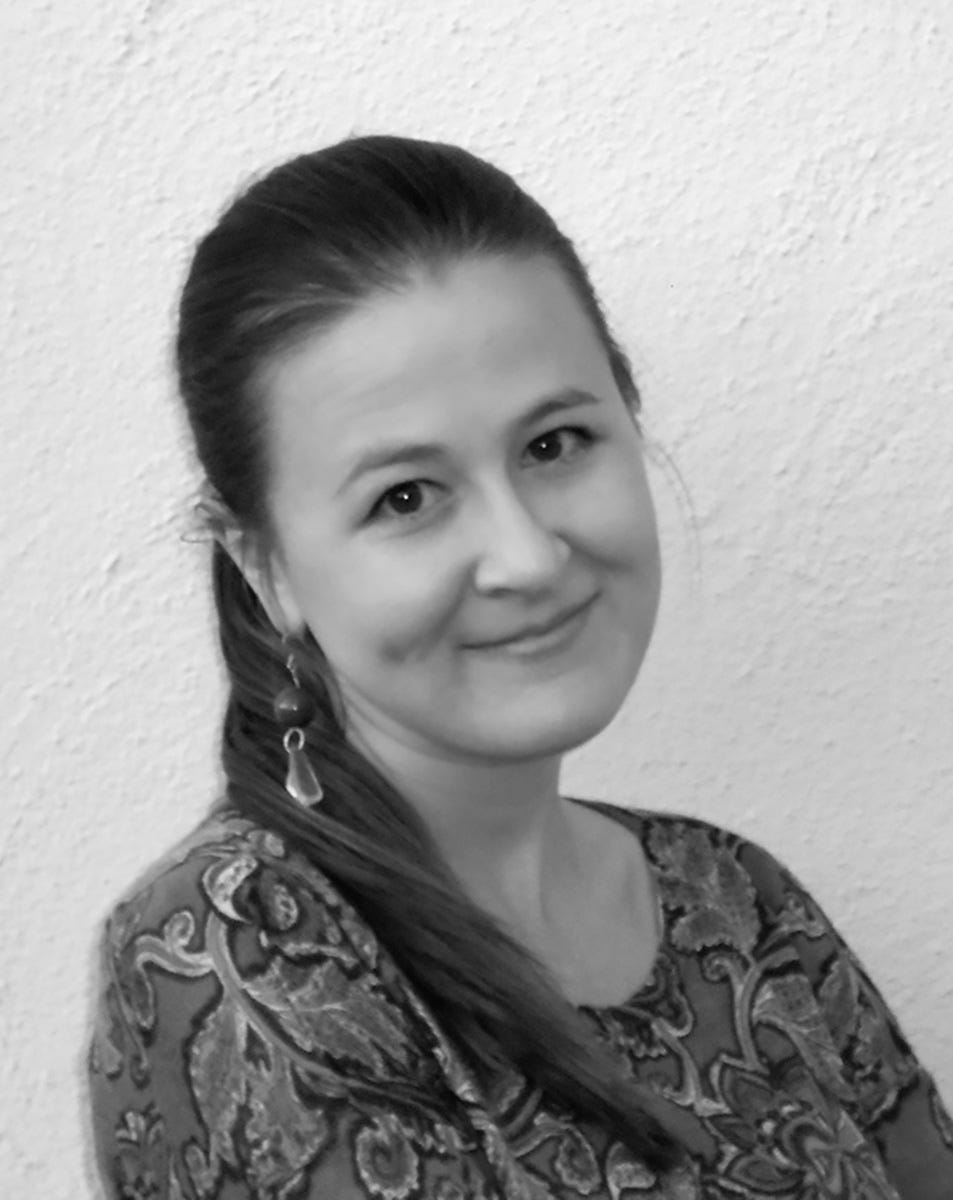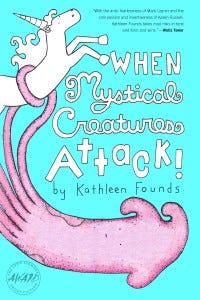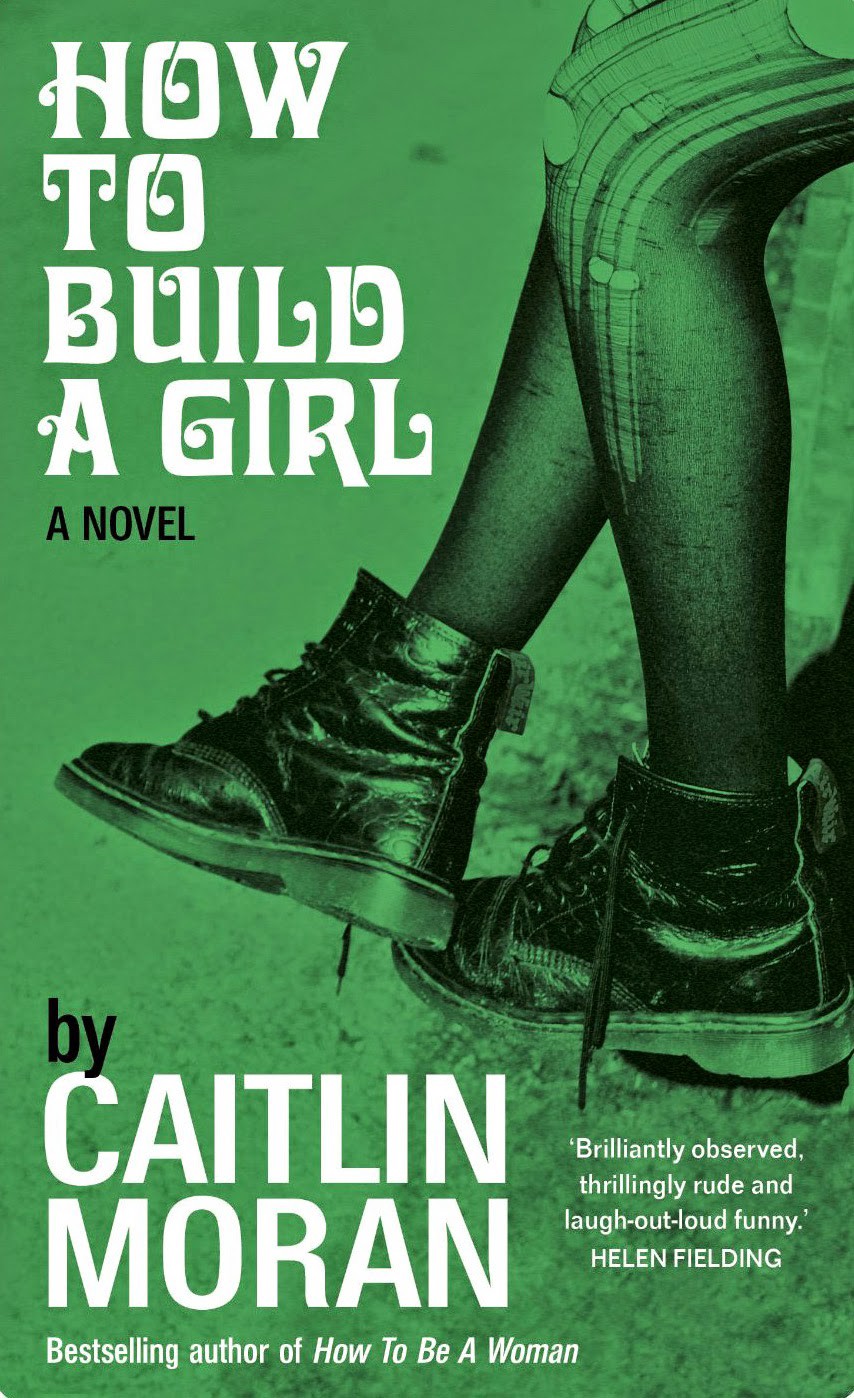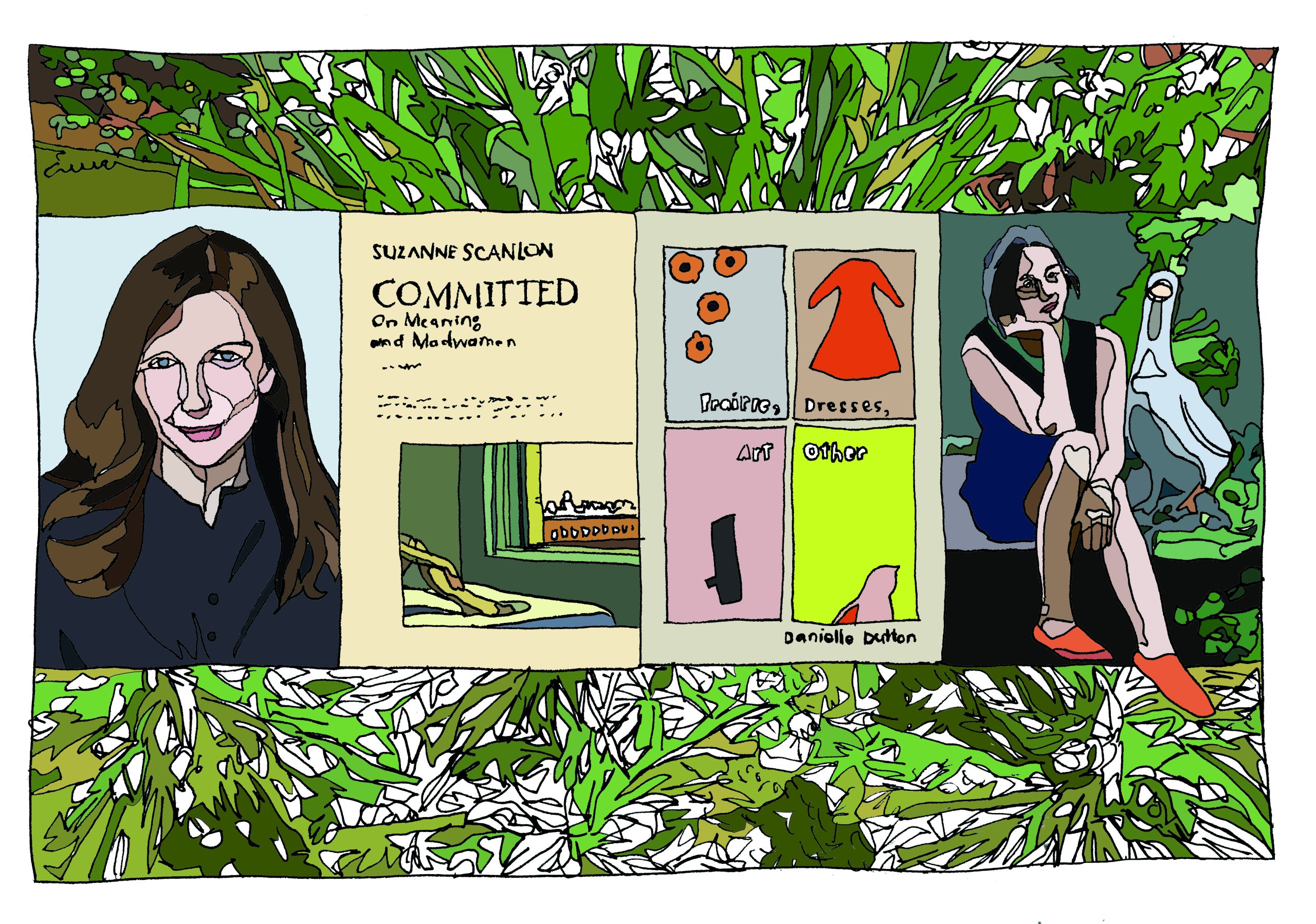interviews
INTERVIEW: Kathleen Founds, author of When Mystical Creatures Attack!

by Daniel Blue Tyx


Kathleen Founds’s novel-in-stories, When Mystical Creatures Attack!, winner of the Iowa Short Fiction Award, begins with a series of journal entries from Ms. Freedman’s high school English classroom in response to the prompt: “Write a one-page story in which your favorite mystical creature resolves the greatest sociopolitical problem of our time.” From there, things only get more surreal. Narrated by way of emails, diary entries, an on-line advice column, and a Methodist women’s fundraising cookbook (recipes include “Dark Night of the Soul Food” and “Valley of the Shadow of Death by Chocolate Cake”), the novel follows the quest of two of Ms. Freedman’s former students to liberate her from an insane asylum run on the “capitalist model of cognitive-behavior therapy” where patients are tasked with rebuilding their Psychiatric Credit Scores. At once madcap comedy, Chihuahua-fanged social satire, and fearless meditation on the nature of inner demons, When Mystical Creatures Attack! asks what it means to live with a whole heart in a deeply unjust world — one in which even our most closely-held ideals can turn against us.
Daniel Blue Tyx: So let’s start with a softball question, just to get us started. I saw that George Saunders said that the thing he loved most about the novel (er…um…sorry, Iowa — am I supposed to call it a collection?) is “the sense that [your] strange and wonderful talent is always working in the service of a deeply humane and hopeful vision of the world.” And the novel itself is a kind of meditation on the nature of what that kind of service to others might actually look like — its necessity, and its limitations. I’m wondering: How does literature itself function within that framework? Is writing in the twenty-first century primarily a way that we keep ourselves as writers sane? Or can it also change the world?
Kathleen Founds: In college, I took a class called “Adventures in Religious Poetry.” We studied Thomas Merton’s translation of Chuang Tzu’s “Poem of the Woodcarver.” In the poem, a woodcarver makes an amazing bell stand for the prince. Everyone at the court is like, “Sweet bell stand! How did you even make it?” The woodcarver explains his creative process. From Merton’s translation: “After three days fasting / I had forgotten gain and success / After five days / I had forgotten praise or criticism / After seven days / I had forgotten my body / With all its limbs / By this time all thought of your Highness / And of the court had faded away / All that might distract me from the work / Had vanished / I was collected in the single thought / Of the bell stand.”
In other words, if you are focused on the reception of your art, you are distracted. Even thinking of the reception in a noble way, as in “This book will change the world!” is a distraction. Martin Luther King said, “If a man is called to be a street sweeper, he should sweep streets even as a Michelangelo painted, or Beethoven composed music or Shakespeare wrote poetry. He should sweep streets so well that all the hosts of heaven and earth will pause to say, ‘here lived a great street sweeper who did his job well.’” There is an intrinsic value in working with your whole heart — even if few notice or value your work.
Writing is cathartic. It lifts me up and calms me down. After writing, I am a better mother, teacher, wife, sister, daughter and friend. Writing enables me to be of service in the world. But I don’t count writing as my contribution to alleviating world-suffering. It seems megalomaniacal to think: “This novel will solve the world!” It would create unbearable pressure. It would keep me from making boner jokes. Unless I somehow ended up thinking: “This boner joke will solve the world.”
That said, if When Mystical Creatures Attack! makes one person laugh or feel less lonely, I will count the book as a success. (A spiritual success. I will count it as a literary success if it gets reviewed in The New York Times and joins Oprah’s book club and wins a Pen/Faulkner Award. The key to avoiding a nervous breakdown this fall will be making sure the spiritual view wins out over my outsize literary ambitions. The two forces are doing battle in my soul at the moment and it feels very rowdy.)
Back to the theme of service — I think of community college teaching, not writing, as my main attempt to make the world a better place. As a younger person, I dreamed of doing work with a far more dramatic social impact (international aid! full time work with at risk youth!). But, like Laura Freedman, I was confronted with “the stunted capacities of my heart.” I do not have what it takes to do full time social work. But, hey, maybe I can help first generation college students enjoy their first English class. We all have to do what we can . . . even if, confronted with the chasm of world-suffering, it does not seem like much.
DBT: In his citation for the Iowa prize, the judge, Wells Tower, compares your work to Karen Russell, which I can definitely see. And there’s obviously some George Saunders in there, too. But as I was reading, I kept thinking about the Russians, and Dostoevsky in particular. Not just because of the multiple references that are in the novel, but also because of the ecstatic lyrical passages, the fearless fixation on the big questions of life and death, good and evil, suffering and redemption, and so on. I imagined the novel as a Dostoevsky novel, if old Fyodor had a web connection, cable TV, and was a woman. Thoughts?
KF: When George Saunders critiqued my MFA thesis, he told me to stop fronting. To be myself. Initially, I was defensive and a little crushed. “I scoop my heart out and put it on paper!” I thought. “And why didn’t George take my thesis and deliver it directly to The New Yorker?” What he was talking about, I think, was my habit of approaching my character’s concerns about good, evil, and the existence of God from a cynical distance. I unconsciously put a coating of cynicism over my stories, assuming it would make them more palatable to literary magazines or peers.
While writing this novel, I kept George Saunders’s advice in mind. “Okay, fine!” I thought. “I will wear my heart on my fucking sleeve. I will just let the preoccupations of my soul run wild.”
My life is pretty staid. But my soul is filled with turbulence, ecstasy, existential terror, despair, and longing for God. Like a Russian novel.
DBT: I agree that the two vocations of teaching and writing have the capacity to work wonderfully together. Not only can writing allow us to become calmer, more fully actualized versions of ourselves — my wife Laura says that she does yoga as meditation, and I write — but I find that teaching also informs my creative work in ways I haven’t always fully appreciated. Looking back at my writing over the past five years (since I started teaching at South Texas College), nearly every piece I’ve completed contains at least some reference to something a student said or did. Especially teaching community college — students have jobs, (often complicated) family entanglements, law enforcement issues, all of those kinds of real-world preoccupations. And a fair number have already failed the course a couple of times, so they need a caring and dedicated mentor. Teaching gives me a sense of purpose when I’m feeling rudderless as a writer, which is a lot of the time. At the same time, my students bring fresh perspectives, rooted in experiences I may or may not share, that challenge me to think about the world, and writing, in a different way.
When I was in graduate school, I remember being told that I spent too much time on my teaching. I was told I was too “nice” to ever be a successful writer. And that made me angry. Granted, teaching can be a time-suck. But for me, you’re either all-in on teaching, or you shouldn’t do it. For that matter, you’re either all-in on life, or you shouldn’t be a writer. Like the quote from MLK — you have to be fully engaged with everything you do.
And that includes parenting…another potential black hole for your time. After the birth of my son, I remember getting so frustrated when he would (inevitably) wake up just when I was starting to get “in the zone” with my writing. It took a lot of practice to learn to simply to simply leave my work behind at those moments, and not expend any unnecessary mental energy thinking about what might have been accomplished. I know that you’ve stayed home quite a bit with your daughter these past two years — and managed to complete an amazing novel in the process. How do you navigate the competing demands of parenting and writing? And teaching, too?
KF: Yes! Teaching offers me an escape from my asphyxiating self-concern. When I’m feeling down, writing doesn’t lift me up. I write a sentence, then stare daggers at it. The sentence’s lack of splendor and genius prove that my attempt to be a writer is a foolhardy, delusional endeavor. Teaching makes me get out of the house, out of my head. After that hour and twenty minutes of 100% engagement with something other than my black thoughts and meager prose, I invariably feel more grounded.
Most of the stories in When Mystical Creatures Attack! have their genesis in jobs. Janice’s rest home stories are inspired by (and by “inspired by” I mean “transcribed from”) my tenure calling bingo at a nursing home. Ms. Freedman’s struggles to wrangle a rowdy class are inspired by my awkward attempt to run an after-school program.
Dan, I remember you describing the creative writing classes you took as an undergraduate. You said everyone wrote stories about “people lying around in their underwear smoking cigarettes.” I think our work as community college teachers saves us from writing stories about people lying around in their underwear smoking cigarettes. For this, we owe our students an eternal debt.
Although now I kind of want us to challenge each other to write fresh, lively, invigorating “smoking cigarettes in underwear” stories. I actually finished When Mystical Creatures Attack! before my daughter was born. I tried sending it to a few agents and they were like, “This is weird. I don’t know what to do with this.” I went through my “They fail to understand my genius! / I will now collapse into a puddle of despair!” routine. Then I had a baby, and didn’t really do anything with the novel until I entered it in the Iowa contest. So, no. I was not able to write a novel while my newborn napped. I was kind of busy weathering emotional roller coasters and leaking milk everywhere.
After Violet was born, I lacked the energy for sustained bouts of fiction. I mostly filled notebooks with descriptions of her chubby neck rolls and milky breath. As she grew older, I wrote essays and humor pieces and drew cartoons and began short stories. To get the time for these modest creative endeavors, it was simple. I just had to give up personal grooming (let those eyebrows grow in! wad up that hair in a bun!), cooking (embrace the frozen burrito!), fashion (hello, saggy maternity pants!), exercise (let breastfeeding burn the calories!) cleaning (forgo dishes in favor of sketching a cartoon about dermoid cysts!) and hanging out with my husband (he’d get home, I’d hand him the baby and go write). So, it is possible to be a mom and a teacher and a writer. You just have to give up everything else that makes you human.
I also hired a babysitter. That helped a lot.
DBT: I can see how it was difficult for agents and editors to know what to make of your novel: How do you market a novel that begins with a whole chapter of journal entries about mystical creatures saving the planet? There’s not exactly a category at Barnes & Noble for madcap comedies that include extended reflections on mental illness, suicide, social inequity, and the nature of the human soul. Though come to think of it, maybe there should be.
Anyway, what I really want to know — marketing aside — is how you approach the use of the strange and the fantastic in your writing. So often, I find that writing outside of the realist vein is weird just to be weird, going after a kind of a shock factor that just isn’t that shocking.
But how does one harness the power of one’s idiosyncratic imagination in the service of a story with a beating human heart? Or, put a different way: How do you make a story weird, but not too weird?
KF: “In the Hall of Old Testament Miracles” (probably the weirdest story in When Mystical Creatures Attack!) was inspired by some real life weirdness in the small Ohio town where I lived after I got my MFA (so that my husband, Dave, could complete his teaching credentials): The “Bible Walk” museum.
The “Bible Walk” museum is home to tableaus of wax figures and mannequins acting out key scenes from the Old and New Testaments. I told my journalist friend Gideon about the museum, and he was like, “you should write an article about life in small town Ohio, I’ll put you in touch with my editor at Harpers.” And I was like, “Sweet! Here is my chance to write my breakout intellectual think-piece cultural critique!” I sat down to write a serious, professional query letter. I typed: “Everyone knows the first second you’re alone with a wax sculpture, it’s going to try to kill you. So why bring the Bible to life with 300 wax figures that are just waiting to hunt us down with shepherd’s crooks and slay us in a manger?”
Harpers, it turned out, was not interested in the piece.
Even when I was trying to be “a serious writer,” my brain was like “But what if the wax figures CAME TO LIFE!?!”
I don’t critically assess my story from a craft perspective and judiciously add weird elements. I try to write something real, then surrender to child-like delight at magic breaking into the mundane.
DBT: This morning, when I stepped outside to take my son to school at 8:15 in the morning, I was greeted with (as you describe in the novel) “searing heat hitting my face like bricks from a bread oven.” You are in California, by the ocean, where I am guessing it is breezy and pleasant. If my math is right it’s been almost a decade since you left, and you’ve lived in practically every corner of the country since. And yet — the landscape of South Texas is such a force in the novel, the details so perfectly chosen. Did you find this distance allowed you a sense of perspective, the ability to render “emotion recollected in tranquility? Is there something in particular about South Texas that has seared it into your imagination?
KF: The first year I lived in South Texas, I tried to write a story every month. The stories were awful. But after I moved away, I looked back through my notebooks, and found these incredibly vivid descriptions of the South Texas landscape. I found journal entries where I’d transcribed the monologues delivered to me by the at-risk youth in my dropout prevention program. Ironically, I hadn’t counted those marginal notations as my “writing time.” I counted my awful stories as my “writing time.” While living in Texas, I couldn’t figure out how to put the journaling I did to burn off steam or my notations on bizarre South Texas highway road-signage into story form. Looking through those notebooks years later, I was finally able to quilt together those patchwork pieces of description and dialogue.
DBT: I keep thinking about what you said about the perils of focusing on reception. In my own work, I find that I am fiercely protective of my privacy as a writer. I don’t share drafts with anyone — not even Laura, who has enabled me this whole time by doing all the things a spouse does to help create a space for writing with two kids — until very late in my process. I’ve often seen this inwardness as a kind of tragic flaw — either an irrational fear of how people will respond to my work, or a missed opportunity to push a particular piece to its full potential with the help of a more objective critical eye. Or maybe it’s just that I’m way too confident in my own abilities to navigate out of the literary corners I’m always painting myself into.
Still, all that being said, I think part of my guardedness is also an attempt to create a space, like in your journal, where I feel that I can be totally honest — both with others, and with myself. And sometimes, like you say, that honesty is a tricky thing. What may feel like honesty one day may a day later feel like just another front.
Anyway, what I’m trying to get to is this: How do you reach a space where you can let the preoccupations of your soul run wild? Helpful hints for achieving a nirvana-like state of creative energy?
KF: That inwardness isn’t a tragic flaw. (Although it is fun and kind of dramatic to imagine you having a tragic flaw.) The privacy is how you create the space for true freedom in your writing. And you do share your work, Dan. You’ve published plenty of your writing.
When I moved to Ohio after graduate school, no one I interacted with had anything to do with the literary world. I was anti-Twitter, I hadn’t heard of Instagram, and I checked Facebook quarterly. There were never more than three fresh messages in my Gmail inbox, and they were all from my mom.
Since my book won the Iowa prize, I’ve made vague lumbering Frankenstein steps towards the online literary world. I joined Twitter. I made a When Mystical Creatures Attack! Facebook page. I researched online literary magazines to see where I might send my book. Associating my computer screen with an imaginary literary audience makes writing harder. I’ve found that I now have to go outside with my pen and spiral notebook to tap into that wild free inner woods of the soul.
Dan, how do you access that place? I remember one time you wrote an innovative, heartbreaking story in one six hour stretch. That seem like pretty profound success tapping into the creative unconscious. I remember I tried to copy your prolific genius and gave myself six hours to write something amazing. I ended up with a short story about an aspiring beauty queen who gets her face chewed off by dachshunds.
DBT: Ah yes, this gets us back to the question about stories that are weird, but not too weird. I have to ask: Why dachshunds?
KF: Dan, do you recall when your wife (then girlfriend) Laura and I were roommates in Texas and we had that rat problem? I heard rats scratching in the walls at night. When everyone got up in the morning, there were rat bites in a bowl of fruit. You examined an apple with little rat teeth marks in it, shrugged, and took a bite. Anyway, I caught one of those rats in a catch-and-release trap and I was walking it to the park when I was accosted by a pack of feral dachshunds. I probably should have stood my ground, but when they got within three feet of me, I dropped the rat cage, turned, and ran.
That’s just Texas, man. But you were saying?
DBT: It’s okay — I was stalling. I wish that I had a good answer — or any answer, really — for your question about accessing the unfiltered subconscious, but the truth is, I just don’t know. Every once in a while, you get lucky, and a piece just comes out (nearly) whole the very first time around. Then again, the essay I just finished took the entire summer to write — and even then, I’m not sure it’s really finished. Or even if it ever will be.
I think maybe the key is not really in being able to access some hitherto inaccessible part of the psyche, or finding some kind of trick to keep the liar inside of us at bay, but rather in simply having a good concept for a story or an essay. If you’re asking an interesting question, or working out an interesting scenario, or have an innovative idea about form or style, or start with a compelling narrative, then the rest will come, sometimes rather quickly.
If you’re not, you could be in trouble. I wrote seven failed novels in graduate school — I don’t think any of them even had a chance to be any good. The basic concepts stunk.
As a writer, though, I’m stubborn. I’ll keep banging away on a piece that didn’t start with a very interesting concept, and the more I struggle, the more invested I become in salvaging it. Sometimes, the piece will move somewhere more interesting — usually after I’ve allowed it to become about something else entirely. Other times, it never gets there.
The thing about it, though, is that I’m a horrible judge of what makes an interesting subject to write about. And I begin every piece with only a vaguely held notion of what it’s going to be about, at least on a thematic level. The only way I know is to just write as much as you can, and see what happens.
That, and to not be afraid of over-writing, or being melodramatic. You can always take it out later.
Anyway, going back to the question of spiritual vs. literary success — I imagine that striking the proper balance is more difficult now that the novel is finished and is being released. Are their ways to make self-promotion more spiritually fulfilling?
KF: The very phrase “self promotion” seems fraught with spiritual peril. I mean . . . what would Jesus do . . . with a Twitter feed?
@sonofgod: Join me at Sermon on the Mount event in Gallilee w/ @JohnTheBaptist! #Blessed
And how would Buddha handle self-promotion, given that Buddha says there is NO self?
My way of coping is to focus on the things I can do that are fun. So, I’m getting my brother to bottle When Mystical Creatures Attack! themed homebrew (if all goes according to plan, it will be a hoppy IPA). I designed some When Mystical Creatures Attack! t-shirts. My book launch party is going to involve a piñata and a bounce house. And I’m working on a cartoon book trailer.
Oh, and I asked a fellow writer to interview me. That’s what this is. And this is fun.









